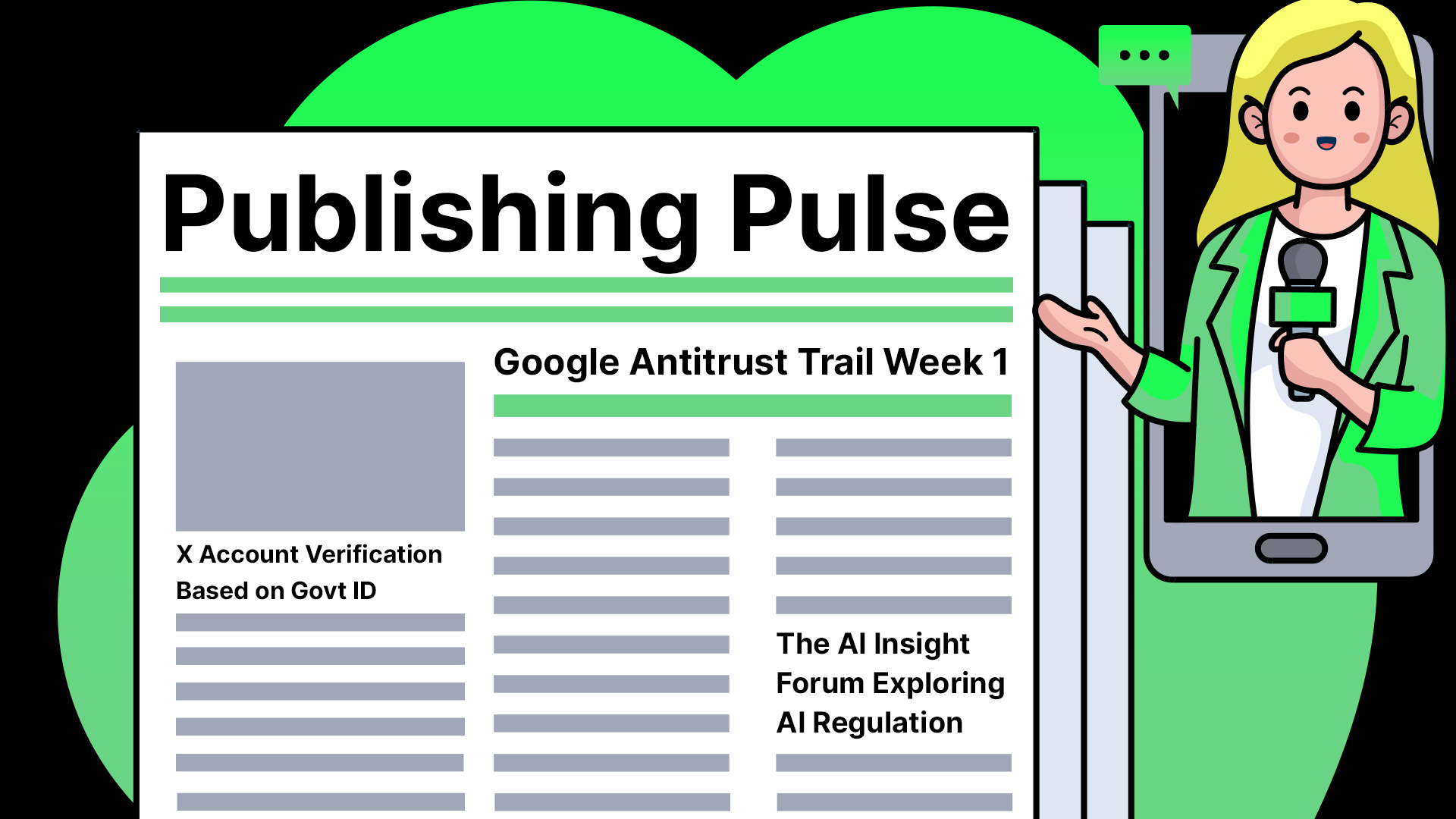
Publishing Pulse: Google’s Ad Pricing Secrets, Google Gemini Rivals ChatGPT, TikTok Shop Hits the US

Get helpful updates in your inbox
Welcome to Publishing Pulse, your weekly source for industry updates in online publishing. Stay informed about the latest trends and breakthroughs in the ad ecosystem, content creation, SEO, AI technology, and monetization.
If you prefer to listen to industry news, you can tune in to The Publisher Lab podcast. New episodes are released weekly on Thursday.
Antitrust Trial Update: Google’s Efforts to Conceal Ad Pricing
The US Justice Department is challenging Google for allegedly using anti-competitive measures to sustain its search engine dominance. The core issue is Google’s alleged use of “default” settings through deals with companies like Apple and Mozilla, ensuring its search engine’s prominence and hindering competitors. The trial will proceed with Google’s defense, and key figures, including CEO Sundar Pichai, will testify.
Google’s request to discuss online advertising pricing behind closed doors in the ongoing antitrust trial is also being contested. The government believes that this pricing information is essential for their case. While keeping sensitive data private is typical in mergers, there’s increasing demand for transparency in high-profile public interest cases. The trial’s result could impact the tech industry and the internet’s future, especially for major tech companies. If found guilty, remedies could range from stopping certain practices to asset divestiture for Google.
“Websites often have to use Google’s ad exchange and ad technology to make money from display ads. This means that Google is both selling and buying ads, essentially double-dipping and taking money at each layer of the process,” says Tyler on this week’s episode of The Publisher Lab podcast, “the lack of transparency in Google’s pricing and alleged preferential treatment for certain companies has raised concerns among the US Congress and the public.

Google New AI System: Gemini
Google’s DeepMind division is working on a new AI system, Gemini, which merges the capabilities of AlphaGo with advanced language modeling. Gemini aims to be a multimodal system, understanding text, images, and more. It will be trained on Google’s Pathways AI infrastructure, potentially making it larger than GPT-3. With features like reasoning, Gemini is seen as an advanced chatbot for various tasks.
As Google pushes Gemini’s development, Meta is also crafting its own AI model to rival OpenAI’s GPT. Gemini’s creation signifies a major leap in AI and resonates with Google’s mission to expand AI accessibility responsibly.
Our hosts expressed skepticism about the short-term impressiveness and usability of Gemini. Google needs to prove itself in the AI field, especially after recent controversies and organizational disruptions.
TikTok Shop Launches in US
TikTok has unveiled TikTok Shop in the U.S., blending shopping with content. Users can now access shoppable videos and LIVE streams, catering to its vast American audience. The platform offers a suite of tools for direct selling and features like “Fulfilled by TikTok” for logistics.
Creators can earn commissions through an affiliate program and join TikTok Shop via the app’s Creator Tools. Integrations with major e-commerce platforms like Shopify and WooCommerce are available. Partnerships with platforms like Channel Advisor facilitate omni-channel business support, and other apps can further enhance functionality. Despite its potential, data privacy concerns persist, which TikTok is addressing by collaborating with reputable payment platforms.
X (Twitter) ‘Chaotic’ Environment For Users
The US government wants Elon Musk to testify in an investigation of Twitter, due to concerns over user privacy and legal compliance. This investigation began before Musk’s acquisition but has since intensified because of his actions. Former Twitter executives claim that the company, after Musk’s takeover and subsequent layoffs, might not meet security standards set in a 2011 FTC agreement. Issues like the hasty launch of Twitter Blue and a plan to give journalists internal access have raised alarms. Twitter aims to prevent Musk’s testimony and is challenging the FTC’s privacy order. The government’s concerns stem from perceived disorder at Twitter post-acquisition. Breaches of the FTC order could bring heavy fines and legal consequences for Twitter and its executives, including Musk.
The Future of AI: A Closed-Door Meeting
Senate Majority Leader Chuck Schumer convened a private meeting with tech magnates like Elon Musk, Mark Zuckerberg, and Bill Gates to deliberate on AI regulation. OpenAI’s Sam Altman called for AI regulations for public benefit and suggested a wealth redistribution system for AI-driven earnings. Zuckerberg pitched an open-source methodology for AI, hinting at Meta’s plans for models like Llama 2. Musk, who’s consistently warned about AI dangers, advocated for a halt in AI development. Inioluwa Deborah Raji emphasized the need to address AI bias. Union representative Meredith Stiehm expressed worries about AI displacing jobs. Meanwhile, Sundar Pichai of Google favored industry-driven regulation and suggested that existing bodies oversee AI in different sectors. The gathering served as a platform for tech leaders to share diverse viewpoints on AI’s future governance.
Several tech giants including IBM, Adobe, and Nvidia have voluntarily pledged to adopt safety, security, and transparency practices in their AI operations. While not mandatory, these promises involve measures such as pre-release AI testing, watermarking AI-generated content, and sharing info about AI vulnerabilities. This move is in line with the Biden administration’s AI strategy, encompassing voluntary pledges, potential executive orders, and legislative pursuits. Adobe has additionally advocated for more companies to back the FAIR Act, which seeks to safeguard individual digital rights. All these endeavors are part of the broader goal to maximize AI advantages, minimize risks, and promote public-private collaboration.

Sarah is a social media expert and successful brand marketer. She has experience growing brands and content across multiple different platforms and is always on the cutting edge of emerging social platform and internet culture trends.
Featured Content
Checkout this popular and trending content

Ranking In Universal Search Results: Video Is The Secret
See how Flickify can become the ultimate SEO hack for sites missing out on rankings because of a lack of video.
Announcement

Ezoic Edge: The Fastest Way To Load Pages. Period.
Ezoic announces an industry-first edge content delivery network for websites and creators; bringing the fastest pages on the web to Ezoic publishers.
Launch

Ezoic Unveils New Enterprise Program: Empowering Creators to Scale and Succeed
Ezoic recently announced a higher level designed for publishers that have reached that ultimate stage of growth. See what it means for Ezoic users.
Announcement
